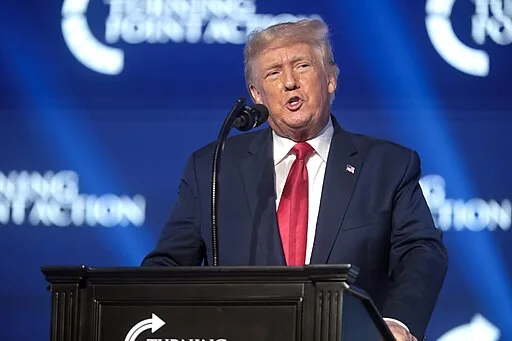Donald Trump’s campaign disputes the debate format and network choice, accusing ABC of bias as issues with microphone use complicate preparations
Former President Donald Trump has threatened to withdraw from the upcoming U.S. presidential debate scheduled for next month, citing concerns over the debate’s network and microphone issues. Trump’s campaign expressed dissatisfaction with the ABC network, which is set to host the debate, alleging that it is biased against the Republican candidate.
The clash between Trump’s campaign and Vice President Kamala Harris’s team intensified on Monday, as debates over the debate format and network continued. Trump’s team has argued that the network’s alleged bias undermines the fairness of the debate, raising doubts about his participation.
Embed from Getty ImagesIn addition to concerns about the network, Trump has highlighted issues with “hot mics,” or microphones that remain live, which could lead to unfiltered or damaging comments being recorded. The former president’s team is worried that such technical issues could compromise the integrity of the debate.
The debate, scheduled to be a critical platform for both candidates ahead of the 2024 presidential election, has already seen significant preparation from both sides. The Harris campaign has pushed for a return to open microphones, arguing that it allows for a more transparent and candid exchange between candidates. However, this format has raised concerns for Trump’s team, who fear that it could lead to unfair disadvantages.
The tension surrounding the debate reflects broader disputes between the two campaigns as they prepare for the high-stakes event. Trump’s threat to withdraw underscores the contentious nature of the upcoming election and the challenges facing debate organizers in ensuring a fair and balanced platform for both candidates.
As the debate date approaches, negotiations between the campaigns and the network will likely continue to address these concerns. The outcome of these discussions will be pivotal in determining whether the debate proceeds as planned or if alternative arrangements are made.
Analysis
Political: Trump’s threat to withdraw from the debate highlights the ongoing tension between his campaign and the media. The dispute over the debate network and format reflects broader political divisions and the high stakes of the upcoming election. The controversy may also influence public perceptions of the candidates and the debate’s credibility.
Social: The debate is a key opportunity for voters to assess the candidates’ positions and qualifications. Disputes over the format and network could affect how the public engages with the debate and the overall transparency of the electoral process. The controversy may also amplify partisan divisions among voters.
Racial: While the debate issue itself does not directly address racial concerns, the broader election context includes discussions on race and equality. The candidates’ handling of the debate and their public statements may have implications for their appeal to diverse voter groups.
Gender: As the first female vice president, Kamala Harris’s participation in the debate holds particular significance for gender representation in U.S. politics. The debate’s format and network choice could impact how her performance and policies are perceived by voters, including issues related to gender equality.
Economic: The debate’s network and format issues could have economic implications for both the candidates and the media. The choice of network affects advertising revenue and viewership, which are important for both the campaign and the network hosting the event.
